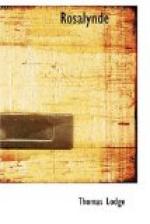Our inclination to stillness and tranquillity is seldom much lessened by long knowledge of the busy and tumultuary part of the world. In childhood we turn our thoughts to the country, as to the region of pleasure; we recur to it in old age as a port of rest, and perhaps with that secondary and adventitious gladness, which every man feels on reviewing those places, or recollecting those occurrences, that contributed to his youthful enjoyments, and bring him back to the prime of life, when the world was gay with the bloom of novelty, when mirth wantoned at his side, and hope sparkled before him.
[Footnote 1: Dr. Johnson defines a pastoral as “the representation of an action or passion by its effects upon a country life.” See The Rambler, Nos. 36 and 37.]
[Footnote 2: The Rambler, No. 36. See also Steele’s essays on the pastoral in The Guardian, Nos. 22, 23, 28, 30, 32. No. 22 is particularly interesting, because in it Steele assigns three causes for the popularity of the pastoral form,—man’s love of ease, his love of simplicity, and his love of the country. Pope’s remarks on the pastoral, which may be found in The Guardian, No. 40, are also worth referring to in this connection.]
Probably Doctor Johnson was entirely right about the perennial charm of the pastoral and in his theory that its charm is potent in the direct ratio to the square of the distance that separates the writer and reader from rural life itself. It is not strange, therefore, that in the newly awakened interest in the classics that characterized the Renaissance, when literature was so largely a product of city culture, the revival of the pastoral should have been one of the first manifestations of the earlier Renaissance humanism.
Spanish Influence. Even when all due credit has been given to the charm of the pastoral romance, it still remains doubtful whether the influence of the Greek and Latin classics alone is sufficient to explain its vogue in the Elizabethan age. Their influence, though undoubtedly great, was scarcely sufficient to account for the naturalization in England of so exotic a form as the pastoral. Indeed the pastoral never was thoroughly naturalized, remaining to the end somewhat alien to its English surroundings.




